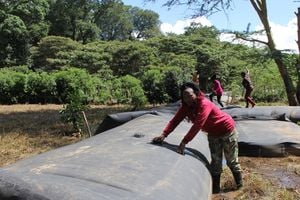Kenya’s race against time to be ready for 2027 Nations Cup in 36 months

Sports Cabinet Secretary Ababu Namwamba (right), Sports Principal Secretary Peter Tum (left) and Football Kenya Federation President Nick Mwendwa chat at Moi International Sports Centre, Kasarani on July 26, 2023 during an inspection tour of the facility led by Confederation of African Football officials.
What you need to know:
- I have covered four Africa Cup of Nations spread over the last two decades and I can tell you the pride the host nation feels and prestige it gains are immeasurable
- Kenya won the rights to host the 1996 Afcon and the 2018 African Nations Championships (Chan) but in both instances, was stripped of the rights because of inadequate preparations
- According to a BBC report, Cote d’Ivoire has spent $1bn (Sh161.4bn) on hosting the competition
Last week, Sports Cabinet Secretary Ababu Namwamba speaking in a measured, laid-back tone at a sports stakeholders breakfast meeting, advised Kenyans to stop being sceptical about preparations for the 2007 Africa Cup of Nations that the country will jointly host with Uganda and Tanzania.
“Here at home in terms of our preparedness, we are well on track. We are on track in terms of targets we have set on infrastructure development. At the regional level, we are so much in sync with Uganda and Tanzania. We consult every week. Let me assure you that East Africa will host a very successful Afcon in 2027. We want Kenya to support us in the preparations and be ready to cheer on Africa's finest football talent in 2027,” he said.
This was assuring. God knows, Kenyans are indeed anxious to see a successful staging of the Nations Cup on home soil come to pass. I have covered four Africa Cup of Nations spread over the last two decades and I can tell you the pride the host nation feels and prestige it gains are immeasurable.
However, the Sports CS must appreciate the doubt niggling the minds of Kenyans is not an aberration. We have been down this road before, twice in fact.
Kenya won the rights to host the 1996 Afcon and the 2018 African Nations Championships (Chan) but in both instances, was stripped of the rights because of inadequate preparations.
Assuming the 2027 Nations Cup will be held from January of that year, Kenya (Uganda and Tanzania) have exactly 36 months to get the stage ready.
For Kenya, it means, at the very minimum, the four stadiums designated as match venues – Moi International Sports Centre, Nyayo Stadium and Kip Keino Stadium, all to be refurbished, and proposed 60,000-capacity Talanta Stadium, must be up and functional for the African football jamboree.
We should be inspired and challenged by what Cote d’Ivoire has done for the 2023 Afcon.
The West African economic powerhouse unleashed six, world class stadiums in five cities for the 24-team tournament, wonderful edifices that have left many Kenyans green with envy as they ponder what would have been had the five promised stadiums here been erected.
Work on the 60,000-seater Alassane Ouattara Stadium in the country’s economic hub city Abidjan started in 2016 and the facility officially inaugurated four years later on October 3, 2020.
It cost $257 (Sh41.8 billion at today’s rates) and is one of the infrastructure legacy of the tournament. It boasts such amenities as an athletics track, conference facilities, gyms, auditorium and VIP facilities
Both Amadou Gon Coulibaly Stadium (capacity 20,000; cost $84m/Sh13.6bn), located in Korhogo and Stade Laurent Pokou (capacity 20,000; cost $68m/Sh10.9bn ), situated in San Pedro, took four years to be completed, from 2019 to 2023 while Stade Charles Konan Banny (capacity 20,000; cost $79m/Sh12.8bn), in the Ivorian capital Yamoussoukro, was constructed in two years, starting from 2019.
It is important to note that Cote d’Ivoire, first bid to host the 2019 Afcon in 2014. It is the same year that Caf announced Cameroon as host with Cote d’Ivoire given the 2021 edition. Because of lack of preparedness in Yaounde, Caf handed Egypt the 2019 tournament while Cameroon were allowed to host 2021 and the 2023 tournament then given to Cote d’Ivoire.
My point here is that the Ivorians had nine years (108 months) to prepare for the 2023 Afcon.
They left nothing to chance. According to a BBC report, Cote d’Ivoire has spent $1bn (Sh161.4bn) on hosting the competition.
I suppose refurbishing the three stadiums in good time should be comfortably managed by Kenya. Constructing a 60,000-seater stadium from scratch in less than three years is by no means inconceivable.
Examples abound. The 61,000-capacity Tottenham Hotspur Stadium was planned for years before construction work started in July 2016 and completed in August 2018, at a cost of £450 (Sh92.3bn).
Arsenal's 60,000-capacity Emirates Stadium also took just over two years to build.
Stade de France was initially built at a cost of $408m (Sh65.9bn) to accommodate 60,000 spectators for the 1998 World Cup. Construction started in May 1995 and took 31 months. It was inaugurated in January 1998.
The Kenya cabinet approved the construction of the Talanta Hela Stadium at Jamhuri grounds last October. The project will be overseen by the KDF who built the 10,000-seater Ulinzi Sports Complex in Lang'ata in an impressive 16 months, at a cost of Sh609 million.
The planned Talanta Hela facility is a considerably bigger undertaking. I understand the original design, shared with the public in September, has been adjusted.
I drove past the proposed site and Nyayo Stadium over the weekend. No sign of any construction work at either location, yet.
As I await the ground-breaking ceremony at Jamhuri ground, you will understand my apprehension entwined with hope that this third time, Kenyans will finally lap up the pride of hosting Africa’s biggest football, nay sports show.
Thirty-six months and counting.





